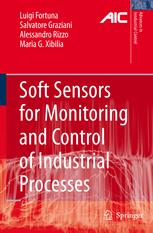

Most ebook files are in PDF format, so you can easily read them using various software such as Foxit Reader or directly on the Google Chrome browser.
Some ebook files are released by publishers in other formats such as .awz, .mobi, .epub, .fb2, etc. You may need to install specific software to read these formats on mobile/PC, such as Calibre.
Please read the tutorial at this link: https://ebookbell.com/faq
We offer FREE conversion to the popular formats you request; however, this may take some time. Therefore, right after payment, please email us, and we will try to provide the service as quickly as possible.
For some exceptional file formats or broken links (if any), please refrain from opening any disputes. Instead, email us first, and we will try to assist within a maximum of 6 hours.
EbookBell Team

0.0
0 reviewsSoft sensors are inferential estimators, drawing conclusions from process observations when hardware sensors are unavailable or unsuitable; they have an important auxiliary role in sensor validation when performance declines through senescence or fault accumulation.
The non-linear behaviour exhibited by many industrial processes can be usefully modelled with the techniques of computational intelligence: neural networks; fuzzy systems and nonlinear partial least squares.
Soft Sensors for Monitoring and Control of Industrial Processes underlines the real usefulness of each approach and the sensitivity of the individual steps in soft-sensor design to the choice of one or the other. Design paths are suggested and readers shown how to evaluate the effects of their choices. All the case studies reported, resulting from collaborations between the authors and a number of industrial partners, raised challenging soft-sensor-design problems. The applications of soft sensors presented in this volume are designed to cope with the whole range from measuring system backup and what-if analysis through real-time prediction for plant control to sensor diagnosis and validation. Some of the soft sensors developed here are implemented on-line at industrial plants.
Features:
• soft-sensor design;
• advice on data selection and choice of model structure;
• model validation;
• strategies for the improvement of soft-sensor performance;
• uses of soft sensors in fault detection and sensor validation;
• soft sensors in use in industrial applications such as a debutanizer column and a sulfur recovery unit.
This monograph guides interested readers – researchers, graduate students and industrial process technologists – through the design of their own soft sensors. It is self-contained with full references and appraisal of existing literature and data sets for some of the case studies can be downloaded from springer.com.
Advances in Industrial Control aims to report and encourage the transfer of technology in control engineering. The rapid development of control technology has an impact on all areas of the control discipline. The series offers an opportunity for researchers to present an extended exposition of new work in all aspects of industrial control.